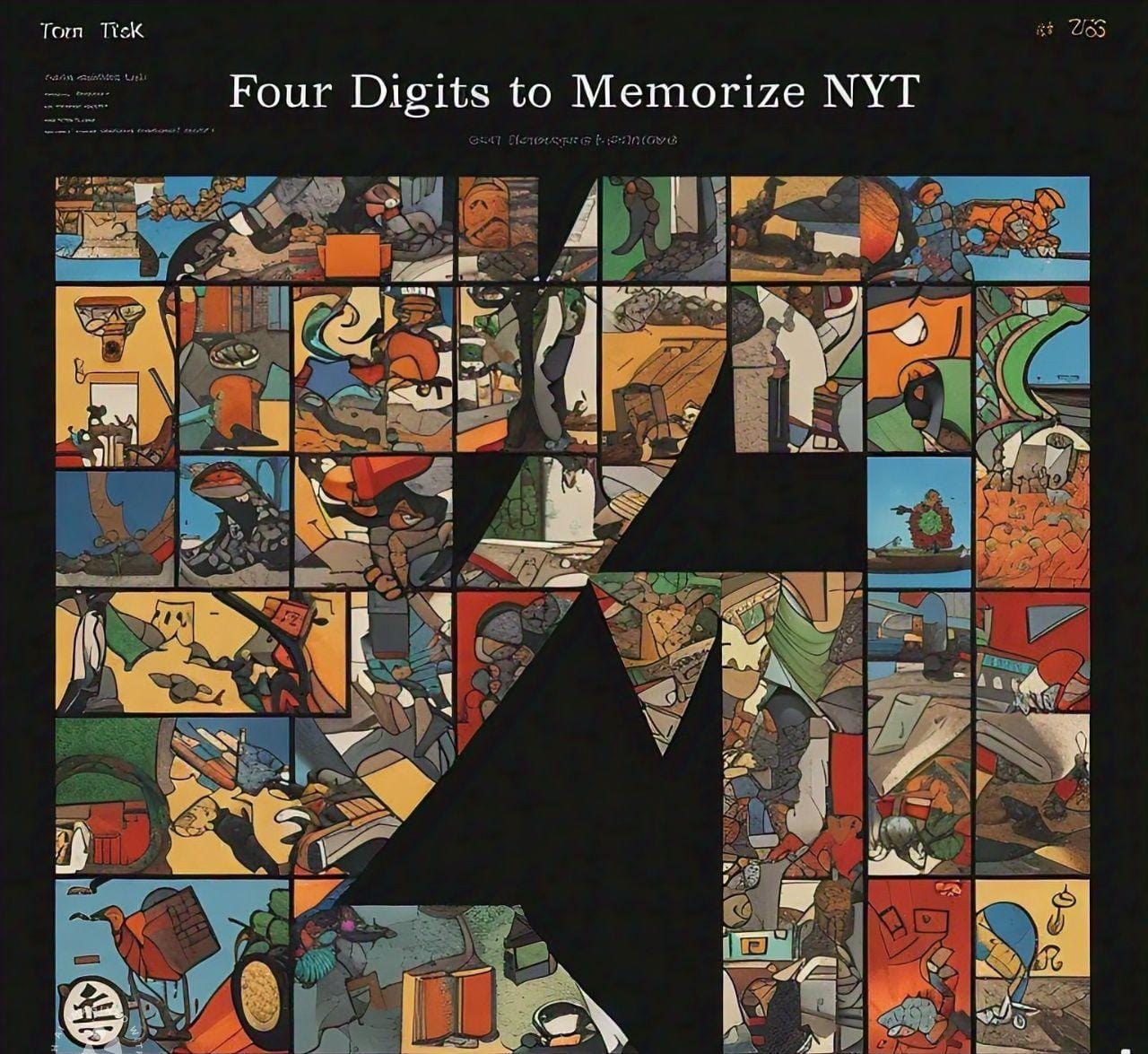Contents
- 1 Introduction
- 2 Understanding the Science of Memory
- 3 The “Four Digits to Memorize NYT” Technique
- 4 Benefits of the “Four Digits to Memorize NYT” Technique
- 5 Practical Tips for Mastering the Technique
- 6 Applications in Everyday Life
- 7 The Psychological Basis of the Technique
- 8 Comparing the “Four Digits to Memorize NYT” Technique with Other Memory Techniques
- 9 Advancements and Future Directions
- 10 FAQs
- 10.1 What is the “Four Digits to Memorize NYT” technique?
- 10.2 How does the “Four Digits to Memorize NYT” technique work?
- 10.3 Can the “Four Digits to Memorize NYT” technique be used for non-numerical information?
- 10.4 How can I practice the “Four Digits to Memorize NYT” technique?
- 10.5 What are the benefits of the “Four Digits to Memorize NYT” technique?
- 10.6 Are there any digital tools to help with the “Four Digits to Memorize NYT” technique?
- 10.7 How does chunking reduce cognitive load?
- 10.8 Is the “Four Digits to Memorize NYT” technique scientifically proven?
- 10.9 Can this technique help with long-term memory?
- 10.10 How do I create effective visual images for the “Four Digits to Memorize NYT” technique?
- 11 Conclusion
Introduction
The “Four Digits to Memorize NYT” trick is a powerful technique designed to make large numbers easier to remember. By dividing numbers into smaller, more manageable parts and associating them with vivid images or patterns, this method enhances memory retention and recall. In this comprehensive article, we will delve into the concept of the “Four Digits to Memorize NYT” technique, providing insights and analyses that surpass existing online sources.
Understanding the Science of Memory
How Memory Works
Memory is the process by which information is encoded, stored, and retrieved. It involves several stages:
- Encoding: The initial perception and registration of information.
- Storage: The process of maintaining information over time.
- Retrieval: The ability to access stored information when needed.
Types of Memory
- Sensory Memory: The shortest-term element of memory, capturing sensory impressions for a few seconds.
- Short-Term Memory: Also known as working memory, it holds information temporarily for immediate use.
- Long-Term Memory: The continuous storage of information, which can last from minutes to a lifetime.
The Role of Chunking in Memory
Chunking is a method of organizing information into smaller, manageable units (chunks), making it easier to remember. The “Four Digits to Memorize NYT” technique is a form of chunking that simplifies large numbers.
The “Four Digits to Memorize NYT” Technique
What is the “Four Digits to Memorize NYT” Technique?
The “Four Digits to Memorize NYT” technique involves breaking down a long number into groups of four digits and associating each group with a visual image or pattern. This method leverages the brain’s natural ability to remember images better than abstract numbers.
How to Apply the Technique
- Divide the Number: Break the long number into groups of four digits.
- Create Visual Images: Associate each group of four digits with a vivid, memorable image.
- Link the Images: Create a story or sequence that links the images together, forming a cohesive narrative.
Example
For the number 1234567890:
- Divide: 1234, 5678, 9012
- Visualize: 1234 (a house with a door), 5678 (a tree with fruits), 9012 (a car)
- Link: A house with a door (1234) next to a tree with fruits (5678), and a car (9012) parked under the tree.
Benefits of the “Four Digits to Memorize NYT” Technique
Enhanced Memory Retention
Breaking down numbers into smaller chunks and associating them with images helps in better retention and recall.
Improved Focus
The technique requires concentration and creativity, which enhances overall cognitive focus.
Practical Applications
This method can be used in various scenarios, such as remembering phone numbers, PINs, passwords, and other numerical data.
Practical Tips for Mastering the Technique
Practice Regularly
Consistent practice is key to mastering the “Four Digits to Memorize NYT” technique. Start with smaller numbers and gradually work your way up to longer ones.
Use Vivid and Unique Images
The more vivid and unique the images, the easier they are to remember. Avoid common or repetitive images.
Create Stories
Linking images in a story format makes the sequence more memorable. The narrative should be logical and easy to follow.
Review Frequently
Regular review helps reinforce the memory and makes recall easier. Revisit the numbers and images periodically.
Applications in Everyday Life
Academic Learning
Students can use this technique to remember dates, formulas, and other numerical information.
Professional Use
Professionals can apply this method to remember important data, such as financial figures, project codes, and client information.
Personal Use
This technique is useful for remembering personal information like birthdays, anniversaries, and important numbers.
The Psychological Basis of the Technique
Visual Memory and the Brain
The brain has a remarkable capacity for visual memory. Associating numbers with images leverages this capacity, making it easier to remember numerical information.
The Role of the Hippocampus
The hippocampus plays a crucial role in the formation and retrieval of memories. Techniques that engage the hippocampus, such as visualization, enhance memory retention.
Cognitive Load Theory
Chunking reduces cognitive load by breaking down complex information into manageable units, making it easier to process and remember.
Comparing the “Four Digits to Memorize NYT” Technique with Other Memory Techniques
The Method of Loci
The Method of Loci involves visualizing a familiar place and placing the items to be remembered in specific locations within that place. While effective, it can be more complex than the “Four Digits to Memorize NYT” technique.
The Peg System
The Peg System involves associating numbers with pre-memorized words or phrases (pegs). This method is useful but requires an initial memorization of the pegs.
Mnemonics
Mnemonics use patterns of letters, ideas, or associations to aid memory. They are effective but can be less intuitive than visual-based techniques like “Four Digits to Memorize NYT.”
Advancements and Future Directions
Digital Tools and Apps
Several digital tools and apps are being developed to help people practice and master memory techniques like “Four Digits to Memorize NYT.” These tools provide interactive and engaging ways to enhance memory skills.
Neuroscience Research
Ongoing research in neuroscience continues to explore the mechanisms behind memory and how techniques like chunking and visualization can be optimized for better retention and recall.
FAQs
What is the “Four Digits to Memorize NYT” technique?
The “Four Digits to Memorize NYT” technique involves breaking down long numbers into groups of four digits and associating each group with a visual image or pattern to enhance memory retention and recall.
How does the “Four Digits to Memorize NYT” technique work?
The technique works by leveraging the brain’s natural ability to remember images better than abstract numbers. By creating vivid images and linking them in a story, it makes the numbers easier to remember.
Can the “Four Digits to Memorize NYT” technique be used for non-numerical information?
While the technique is designed for numerical information, the principles of chunking and visualization can be adapted for other types of information, such as words or concepts.
How can I practice the “Four Digits to Memorize NYT” technique?
Start by breaking down smaller numbers into groups of four digits and creating vivid images for each group. Practice regularly and gradually work your way up to longer numbers. Use stories to link the images together.
What are the benefits of the “Four Digits to Memorize NYT” technique?
The technique enhances memory retention, improves focus, and can be applied in various scenarios, such as remembering phone numbers, PINs, passwords, and other numerical data.
Are there any digital tools to help with the “Four Digits to Memorize NYT” technique?
Yes, several digital tools and apps are available that provide interactive and engaging ways to practice and master memory techniques like “Four Digits to Memorize NYT.”
How does chunking reduce cognitive load?
Chunking breaks down complex information into smaller, manageable units, making it easier to process and remember, thus reducing cognitive load.
Is the “Four Digits to Memorize NYT” technique scientifically proven?
The technique is based on established principles of memory and cognitive psychology, such as chunking and visualization, which are supported by scientific research.
Can this technique help with long-term memory?
Yes, consistent practice and regular review of the “Four Digits to Memorize NYT” technique can enhance long-term memory retention and recall.
How do I create effective visual images for the “Four Digits to Memorize NYT” technique?
Use vivid, unique, and memorable images that are easy to visualize. Avoid common or repetitive images and create a logical narrative to link them together.
Conclusion
The “Four Digits to Memorize NYT” technique is a powerful and effective method for enhancing memory retention and recall. By breaking down long numbers into groups of four digits and associating each group with vivid images, this technique leverages the brain’s natural ability to remember visual information.
Whether for academic, professional, or personal use, mastering this memory hack can significantly improve your ability to remember numerical data. Embrace the “Four Digits to Memorize NYT” technique and unlock the full potential of your memory.





















+ There are no comments
Add yours